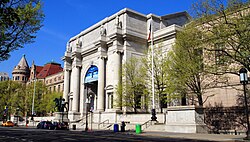American Museum of Natural History
 View of the east entrance |
|
| Data | |
|---|---|
| place | New York City |
| Art |
Natural History Museum
|
| architect | Calvert Vaux , Jacob Wrey Mold (museum); James Stewart Polshek (Rose Center for Earth and Space) |
| opening | 1869 |
| Number of visitors (annually) | approx. 5 million (2011) |
| management |
Ellen Victoria lining
|
| Website | |
The American Museum of Natural History on West Central Park at 79th Street in New York is one of the largest natural history museums in the world.
history
President
The first presidents of the museum were John David Wolfe (1870–1872), Robert L. Stuart and Morris Ketchum Jesup , they are considered to be the founders of the museum. The fourth president, Henry Fairfield Osborn , was appointed in 1906. F. Trubee Davison was President from 1933 to 1951 and A. Perry Osborn was acting President from 1941 to 1946.
Shortly after it was founded in 1869, the museum moved to Manhattan Square in 1874. The museum, which extends over four blocks, was built between 1874 and 1877 by Calvert Vaux and Jacob Wrey Mold (1825–1886).
research
In 1976, the museum's animal experiments came into the public eye through a campaign by animal rights activist Henry Spira . The massive pressure exerted on the museum by opponents of animal experiments, the media and politics led to the experiments being discontinued in August 1977.
New buildings
The Rose Center for Earth and Space by the architect James Stewart Polshek (* 1930) opened in 2000. Polshek called his work a “cosmic cathedral”, popularly it is called “Christmas tree ball in a glass box”. The name comes from the sphere installed in the building, which can be seen in a transparent cube. The Hayden Planetarium is located in the upper half of the sphere , and the Big Bang Theater is in the lower half of the sphere .
Like numerous other natural history museums , the AMNH is also trying to get new presentations. For example, at the end of the 20th century, the history of the development of vertebrates was shown in an exhibition with fossils , among other things .
description
The history of mankind is dealt with on four floors - from the Stone Age to the Space Age . Viewing the entire collection in one day is considered difficult. The museum has over 30 million objects and exhibits ready for its visitors and science. It has its own IMAX cinema and its own underground station. Attractions include the new Rose Center for Earth and Space with the Hayden Planetarium and the 563 carat “Star of India”, the largest sapphire ever found . Other exhibits include a life-size blue whale , a 19.2 meter long single- stemmed cedar war canoe used by the Haida Indians, and many dinosaur skeletons. There is a Theodore Roosevelt monument in front of the main entrance towards Central Park .
The museum is also a research facility with over 200 academic staff in various fields including anthropology, astrophysics, geology, paleontology, and zoology. Own curators were Margaret Mead and Franz Boas in anthropology and Roy Chapman Andrews in paleontology.
Others
The plot of the original book for the film The Relic of Douglas Preston and Lincoln Child takes place in the American Museum of Natural History, but the film itself was shot in the Field Museum of Natural History . However, several other works by Preston and Child are in or about this museum, namely Attic, Formula, Dark Secret, Maniac and Blue Labyrinth. The film comedy Nachts im Museum , with Ben Stiller in the lead role as the night watchman, is also set in this museum.
Rose Center for Earth and Space
The Rose Center for Earth and Space was designed by James Stewart Polshek . An illuminated sphere with a diameter of 27 meters hovers in a large glass cube for passers-by. This is where the Hayden Planetarium is located . The Full Moon exhibition shows 75 lunar photographs from NASA's Apollo mission, which are otherwise rarely seen .
literature
- Douglas J. Preston: Dinosaurs in the Attic. An Excursion into The American Museum of Natural History. St. Martin's Press, New York NY 1986, ISBN 0-312-21098-1 .
- The American Museum of Natural History: an introduction 1972 . Previously published as: General guide.
Web links
- Museum website
- American Museum of Natural History at Google Cultural Institute
- American Museum of Natural History , New York (October 30, 1880) in “Science”, Vol. 1
- The American Museum of Natural History - Photo collection and education
- 2o photos best shots The American Museum of Natural History just finished renovating its Teddy Roosevelt Memorial and its Hall of North American Mammals. We give you a sneak peek.
Individual evidence
- ^ World's Most-Visited Museums. No. 7 American Museum of Natural History, New York City. Travel + Leisure, November 2011, accessed March 2, 2017 .
- ^ History 1869-1900. Retrieved November 22, 2017 (American English).
- ↑ Peter Singer: Henry Spira and the animal rights movement. Harald Fischer Verlag GmbH, Erlangen 1998, ISBN 3-89131-404-3 , pp. 80-81.
- ↑ Hayden Planetarium. Retrieved November 22, 2017 (American English).
- ^ Rose Center For Earth And Space - arcspace.com . In: arcspace.com . ( arcspace.com [accessed November 22, 2017]).
- ↑ Werner Skrentny. DuMont Travel Paperback New York. 2009. p. 176 ISBN 3770172426
- ↑ Hayden Big Bang Theater. Retrieved November 22, 2017 (American English).
- ↑ The world of filming locations: At night in the museum . In: Filmtourismus.de . May 14, 2014 ( filmtourismus.de [accessed November 22, 2017]).
Coordinates: 40 ° 46 ′ 50 ″ N , 73 ° 58 ′ 25 ″ W.

